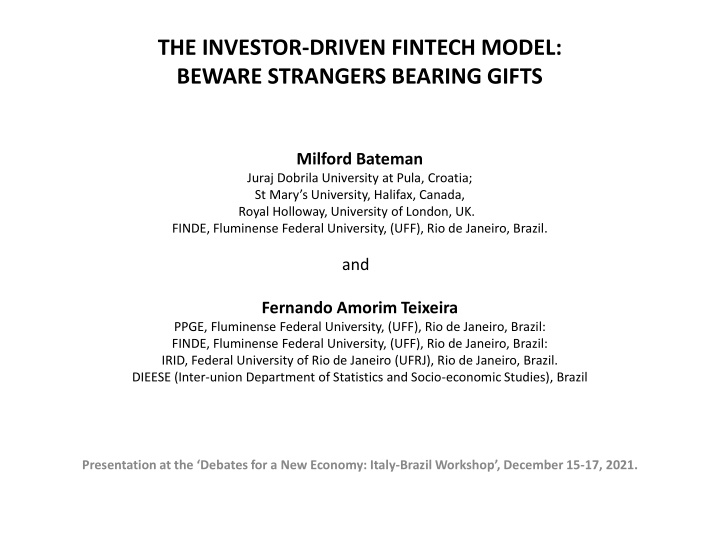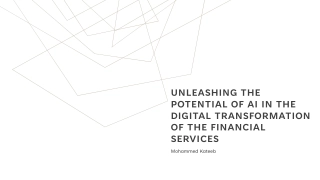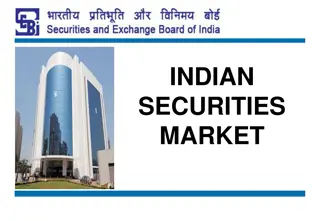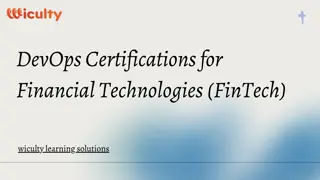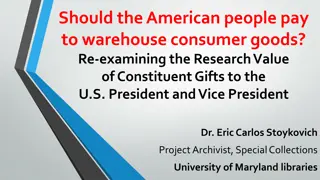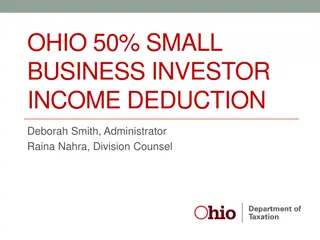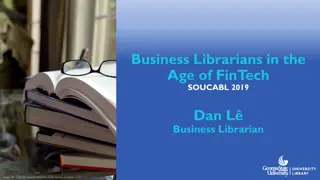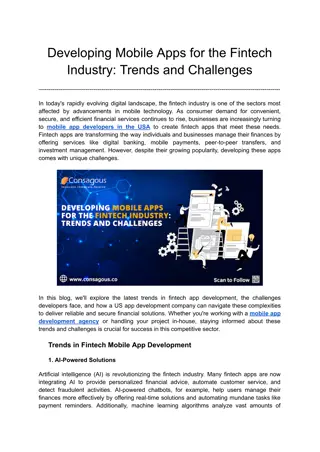Investor-Driven Fintech Model: Beware of Gifts
Financial technology, or fintech, has transformed the way we access and utilize financial services. However, the emergence of an investor-driven fintech model raises concerns about governance and societal impact, as it primarily serves the interests of a narrow elite focused on private enrichment. The evolution of fintech under a neoliberal framework highlights the need to critically examine its implications on economic structures and power dynamics.
Download Presentation

Please find below an Image/Link to download the presentation.
The content on the website is provided AS IS for your information and personal use only. It may not be sold, licensed, or shared on other websites without obtaining consent from the author.If you encounter any issues during the download, it is possible that the publisher has removed the file from their server.
You are allowed to download the files provided on this website for personal or commercial use, subject to the condition that they are used lawfully. All files are the property of their respective owners.
The content on the website is provided AS IS for your information and personal use only. It may not be sold, licensed, or shared on other websites without obtaining consent from the author.
E N D
Presentation Transcript
THE INVESTOR-DRIVEN FINTECH MODEL: BEWARE STRANGERS BEARING GIFTS Milford Bateman Juraj Dobrila University at Pula, Croatia; St Mary s University, Halifax, Canada, Royal Holloway, University of London, UK. FINDE, Fluminense Federal University, (UFF), Rio de Janeiro, Brazil. and Fernando Amorim Teixeira PPGE, Fluminense Federal University, (UFF), Rio de Janeiro, Brazil: FINDE, Fluminense Federal University, (UFF), Rio de Janeiro, Brazil: IRID, Federal University of Rio de Janeiro (UFRJ), Rio de Janeiro, Brazil. DIEESE (Inter-union Department of Statistics and Socio-economic Studies), Brazil Presentation at the Debates for a New Economy: Italy-Brazil Workshop , December 15-17, 2021.
A definition Financial technology, or fintech , can be defined as Computer programs and other technology used to support or enable banking and financial services. We restrict our analysis to its simplest form, which involves a greatly enhanced ability to transact financial services via a mobile phone or smart device, making it easier, cheaper and quicker to: (1) access a loan (2) make a savings deposit (3) transfer and receive money (4) pay for and be paid for goods and services.
Its a major new innovation Thanks to the arrival of M-Pesa along with major advances in fintech applications in China, the viability of new forms of financial technology was abundantly demonstrated Venture capitalists, investors and major corporations saw a massive new profit stream that they could exploit, especially in the Global South Governments in the Global North also saw a way for its own corporations to make huge profits in the Global South which could be repatriated Some of the most enthusiastic fintech advocates began to argue that fintech was about to usher in a new golden age of global free market capitalism.
Viability of four basic financial services verified M-Pesa demonstrated to the world the operational and commercial viability of four basic fintech-based services: Microcredit Remittances Savings Payments As a result, M-Pesa was anointed as the global 'best practice' example that governments in the Global South should try to recreate.
But only one governance model of fintech emerges: the investor-driven fintech model Fintech is a neutral technological advance that clearly works in a technical sense The key to its impact in society is therefore how it is governed And the fintech model is purposefully structured almost everywhere so far to operate under a neoliberal governmentality framework. The fintech model is evolving in ways that overwhelmingly serve the interests of a narrow elite within society dedicated to advancing its own goals in terms of: (1) creating new forms of private and corporate enrichment, especially by Global North investors and corporations (2) embedding neoliberal individualistic ideology among the global poor, thereby to extend the neoliberal era
Fintech begins to create huge excitement in the international development community Notwithstanding its own narrow goals, the investor-driven fintech model was pitched as a way to promote sustained poverty reduction in the Global South. Achieving this laudable goal was centrally linked to the fintech industry's ability to advance the goal of 'financial inclusion If global poor are 'included' within the global and local financial systems, it is argued, they will possess the necessary wherewithal to escape their poverty. Believing in this hugely seductive but largely false narrative (see Mader 2017) narrative, the international development community began a major effort to help fintech applications expand right across the Global South. Global poverty, it was said, was on its way, finally, to becoming part of history.
But is this what happens? As with many new innovations, fintech has led to many positive initial benefits being enjoyed by the Global Poor which the fintech literature celebrates without any caveats As time has gone on, however, the initial gains accruing to the global poor are increasingly being swamped by the downsides linked to the fact that fintech is now an investor-driven phenomenon We can identify at least six major downsides to the investor-driven fintech model:
1. Investor-driven fintech is helping to create destructive local labour market dynamics Policy of mass entrepreneurship evolved from 1960s and SAPs, compounded by the 'bricks and mortar' microcredit model in 1980s making it even easier, quicker and cheaper for the global poor to access as much microcredit as they need in order to engage in a range of petty business activities But results of this mass entrepreneurship experiment have been largely negative (Bateman 2010; Bateman and Chang, 2012; Mader, 2015; Bateman, Blankenburg and Kozul-Wright, 2019) Creates higher levels of entry, but also higher exit churn leaving many individuals worse off (loss of any initial gains, loss of collateral and savings, reputational loss, etc) Downward pressure on average incomes affects new entrants and incumbents equally Other anti-social impacts such as worse working conditions, turf wars, social violence, crime, intensified hours worked (Davis, 2006) Uses capital and effort that could be better utilised by formal SMEs (Antonioni and Chang, 2021) By now seeking to provide massive ADDITIONAL quantities of digital microcredit, the global fintech sector is exacerbating a deteriorating situation in already saturated local economies The emerging let them eat digital microcredit approach is thus not going to address the problem of global poverty, but will actually intensify the problem it purports to solve
2.Investor-driven fintech based SME lending models are 'anti-developmental' Rich body of evidence showing that developmentally effective SME lending is (1) crucial to sustainable economic development, and (2) based on building local relationships and networking, quality infrastructure, cooperation and trust Successful SME development is NOT dependent on the QUANTITY of funds available to SMEs so much as the QUALITY of the eco-system in which they are dispersed Crowdfunder and P2P lending models, however, use their innovations (algorithmic scoring, machine learning, AI, social media use, etc) to find those SME clients capable of repaying high interest rate loans over the shortest time period of time: it is thus the apotheosis of Friedman s core idea that the only purpose of business to maximise profits Crowdfunder lenders have no capacity or interest to identify, fund and support growth- oriented SMEs (for example, where break-even points are several years into the distance) Crowdfunder lending is simply way for the lender to better maximise profits: it is NOT going to promote sustainable development and, in fact, is likely to undermine this goal as the wrong type of here today and gone tomorrow SMEs are supported.
3.Investor-driven fintechs undermine social solidarity networks Fintech and mobile money channels have expanded, formalised and monetised social solidarity networks, including across international borders Household survival in the Global South is aided by fintech through quicker, easier and cheaper access to a larger volume of remittances provided by family and friends. But the social solidarity networks upon which this activity takes place will begin to disintegrate through over-use, thus creating the risk of 'killing the goose that lays the golden eggs'. Fintechs are also introducing new profit points which involve consumers tied into both social grant and remittance networks, with the exploitative potential of these increasing fast going forward
4.Investor-driven fintech exacerbates existing over-indebtedness in the Global South Investor-driven fintech models make it possible for the global poor to access as much microcredit as they want 'at the touch of a few buttons'. However, fintech investors need to reach scale in order to begin to earn profits to repay themselves and investors quickly, which precipitates a policy of reckless lending. Fintech will aggravate the already huge problem of household over-indebtedness in the Global South (already the situation is very bad in Kenya and South Africa)
5. Investor-driven fintech helps create a criminogenic environment Compared to the use of cash money, many claimed fintech would significantly reduce the extent of theft, fraud and other financial crimes (for example, see Beck, Pamuk, Ramrattan and Uras 2015; and Rogoff 2017). However, investor-driven fintech sector has become subject to a wave of fraud and financial crime that is now a huge and growing problem in the Global South. Yet so far, with the obvious exception of China (see Turrin 2021), ideology and profiteering have prevented most countries from making major changes to the operations and regulatory structures governing investor-driven fintech sectors And even when measures are taken, these are all too often ignored or simply circumvented by savvy investor-driven fintechs seeking high financial returns In a worse case scenario, the investor-driven fintech model has helped create an almost perfect criminogenic environment within which a wide range of anti-social developments have become almost unstoppable.
6.Investor-driven fintech is a form of 'digital extractivism' Fintech based services maximise profits for the providers of these services, much of which is then quickly shifted out of the country and into the hands of wealthy investors. This is said to be the most efficient outcome possible for everyone, including for the global poor, as it represents a free market in the generation and allocation of capital (i.e., capitalism). However, fintech can best be viewed as a turbo-charged version of previous 'extractivist' models of natural resource exploitation based on colonial and imperial power, and into the second half of the 20th century based on private corporation-controlled natural resources Today, by mining the digital-financial transactions of the poor in order to accumulate often staggering financial returns (see for example Safaricom s profits), the investor-driven fintech model has essentially updated these extractivist processes of old to achieve the same end result. An investor-driven fintech will reduce the chances that poor communities in the Global South can progress 'under their own steam' thanks to the careful reinvestment of local financial surpluses, this being a circular process that economic history shows is the most effective way to develop a locality. We might refer to this 21st century update of previous extractivist models as 'digital extractivism'.
The secret to the success of fintech is sincerity: once you can fake this, you have got it made Fintech advertised as including the global poor into the financial system The false impression is created that this is somehow a socially progressive move that will allow the global poor to individually address their poverty But the achievement of this mere metric does not equate to poverty reduction Poverty reduction and local economic development are major tasks that require many collective actions and societal changes, especially involving a developmental state and deploying the collective capabilities of the poor Plus, economic history tends to shows that successful economic development actually creates financial inclusion: it is not driven by it! The use of the word inclusion is actually a euphemism for capturing the global poor within a fintech net from which the global poor cannot escape and which allows for their targeted exploitation as profit points
Conclusion: investor-driven fintech is an anti-development intervention Basic fintech services are technological innovations that, if structured in a certain way, could greatly benefit humankind (see King and Petty, 2021) But the dominant investor-driven fintech model that emerged in the 2010s is structured to appropriate the benefits of fintech for its narrow core of stakeholders We pointed to at least 6 areas in the pioneering countries (Kenya and China in particular) where the heady rhetoric of fintech diverts significantly from the sour reality As with the case of sub-prime mortgages in the USA, the notion that fintech is all about addressing the problems of the poor is an equally false cover story concocted to ensure governments in the Global South do not regulate fintech investors We urgently need to find alternative progressive fintech models that place sustainable economic development, equality, empowerment and human dignity at the heart of operations (see Bateman and Teixereira, forthcoming)
The accompanying seminar paper will be posted at: https://www.researchgate.net/profile/Milford-Bateman For any further queries, contact us on: milfordbateman@yahoo.com and fernando_tx@yahoo.com.br
